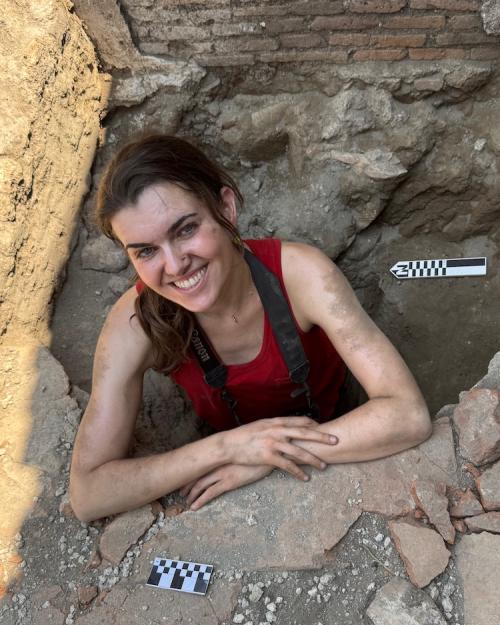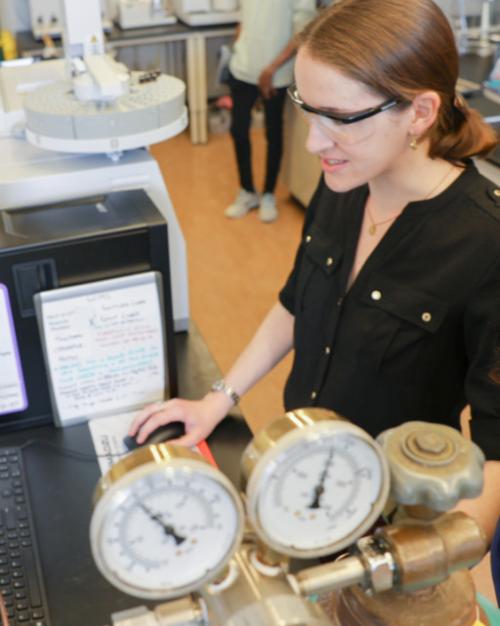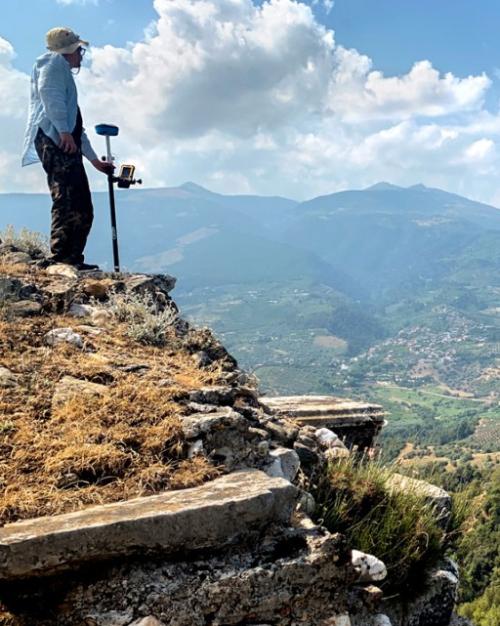Every year the Society for the Humanities, located in the A.D. White House, brings together Cornell faculty, graduate students, and visiting fellows to work on research, participate in seminars and workshops, and teach innovative courses focused around an annual interdisciplinary theme. The 2020-2021 theme, "Fabrication", invited scholars to explore the act of making from a variety of perspectives, considering both the positive and negative connotations of the word “fabrication”, which refers to things that are “both made up and made real,” and including the fabrication not only of physical objects but also of communities, identities, agencies, and systems of power.
This broad and thought-provoking theme attracted several scholars pursuing research on the classical world; in fact, four out of the seventeen fellows this year are in Classics or Classics-adjacent fields, including two from Cornell’s own Department of Classics. Their takes on the theme of fabrication range from the literal making of built spaces to the theoretical making of self-identity, and engage with evidence spanning from fifth-century B.C.E. Greek drama to twentieth-century critical theory.
Nicole Giannella, Assistant Professor of Classics at Cornell University, is studying the Roman fabrication of the idealized slave and the consequences of the inability to fashion slaves that fit this ideal as a way to begin recovering the subjectivity of ancient enslaved peoples. Her book, The Mind of the Slave: The Limits of Ownership in Roman Law and Society, will consider the images of the slave as maker and the slave as faker in Roman society. The idea of the "homo faber" (“man as maker”) is said to have come from a dictum of the fourth-century B.C.E. Roman censor Appius Claudius Caecus: “Faber est suae quisque fortunae” (“Man is the maker of his own fortune”). Giannella says, “His dictum...captured the virtues of the Roman Republic, a time of idealized self-reliance in which the honorable Roman man wanted for little beyond what he could provide for himself. Not quite a century after Appius’ lifetime though, the Roman Republic expanded radically through warfare and colonization, in the process acquiring a vast number of slaves, and was transformed into a slave society. This shift to what has been described as the slave mode of production influenced far more than Rome’s economy but had dramatic effects on every facet of society from factory production to law courts to the arts. As slaves took up primary places in the acquisition and production of goods in Roman society, the image of "homo faber" needs to be nuanced to include a "servus faber", or slave as maker, and, because their role is involuntary and they may resist, the slave as faker.” Her project investigates what Eugene Genovese called “the world the slaves made” by looking at “three critical moments of ideation and production in the life of a slave”: 1) purchase at the slave market; 2) placement in a particular job; and 3) end of the owner-slave relationship.
Jill Frank, Professor of Government at Cornell University and member of the Field of Classics, is engaging with Plato, Aristotle, and Athenian comic and tragic poets to examine the fabrication of democratic equality. In contrast to modern liberal political thought that views equality as intrinsic to human beings, the Greeks saw equality as “not given but made”. In her book The Beauty of Equality Frank studies the beauty of democracy by exploring the classical Greek idea that “democratic equality depends on proportionality” and that proportionality is itself “constitutive of beauty”.
Georgia Frank, Professor of Religion at Colgate University, is considering the roles of built environments and ritual spaces in fabricating the emotions of ancient Christians following the legalization of Christianity in the Roman Empire. In particular, she is interested in the emotional experience of those she calls “lay Christians”, that is, the non-monastic and non-ordained participants in Christian worship and ritual. Her book, Feeling Christian: The Reeducation of the Emotions among the Laity in Christian Late Antiquity, will focus on Greek-speaking Christians in the fourth through sixth centuries C.E. and explore how physical spaces, as well as the songs, sermons, and rituals performed in them, “created, conjured, or combined” emotions, teaching Christians to “feel, sing, move, reenact, and embody a mix of emotions” together. Important to her study is the acknowledgement that emotions cannot always be neatly categorized, but are often “messy and confusing”, involving an experience more complex than any single emotion such as anger or sadness or joy. In addition, Frank expands the scope of “space” to consider not only the built components of spaces such as churches and baptistries, but also the role of, for example, night as a space that can impact and intensify emotion.
Mathura Umachandran, a Postdoctoral Associate in Classics at Cornell University, is investigating how the first generation of critical theorists from the Frankfurt School used Greco-Roman myth in their critique of late capitalism and modernity’s self-fabrication as supremely rational. Focusing in particular on Theodor Adorno, Max Horkheimer, and Herbert Marcuse, her book Critical Mythologies: Classical Reception and the Frankfurt School explores “how the Frankfurt thinkers critically repurpose mythological figures of reason”, such as Oedipus, Odysseus, and Prometheus, in order to “interrogate...the telos of progressive history”.
In addition to their individual research, each of the fellows teaches a Society for the Humanities seminar geared toward a small group of advanced undergraduates and graduate students. With the exception of Mathura Umachandran, who taught her seminar “Homer and Global Modernity” during the Fall 2020 semester (see here for more on her experience planning and teaching this course), all of the aforementioned fellows are teaching their seminars this semester. Each seminar is related to the focal theme and the research project that the fellow is undertaking, but the Society also encourages creativity and experimentation in the implementation of the seminar. Jill Frank, for example, is teaching a course called “Making Equality” which touches on the classical Greek authors she is examining in her book, but also includes a wide range of political thinkers from throughout history as a lens through which to consider recent U.S. Supreme Court cases and legislation and their relation to the fabrication of equality.
Nicole Giannella, whose course “Constructing Antiquity: The World the Slaves Made” focuses on “the contrast between the representation of enslaved people in different genres and media and the reality of how enslaved people were exploited to construct the society that underpinned this cultural imagination”, hopes that her students will learn more about the extent to which slavery permeated every aspect of ancient slave societies like Athens and Rome. She says, “I am hoping students will discover something new about the role enslaved people played in the part of antiquity they are most interested in, be that the archaeology of the Roman villa or Aristophanic comedy.” For her part, Giannella is especially looking forward to an upcoming unit on Roman literary production and enslaved labor, where she will discuss the representation of slaves in Latin letters with her students.
Georgia Frank likewise wants to give her students the opportunity to relate their personal interests to the topic of her seminar, “Religion, Emotion, Imagination”. She says that elasticity was one of her primary goals when constructing the syllabus for the course, and she therefore spent half of the first class session meeting individually with each student so that she could get a better idea of who they were, what interested them about ancient emotions, and where their common ground with the other students lay. Frank, whose class consists mostly of graduate students, welcomes the opportunity to work with graduates as they explore and deepen their own research passions. She says, “I want to honor that and take it very seriously.”
Despite the unusual circumstances the fellows have faced during the 2020 COVID-19 pandemic, they all agree that their experience in the Society for the Humanities has been valuable. They have especially enjoyed having time to dedicate to their research projects and the opportunity to engage with other scholars from diverse disciplines in the humanities who are working on projects centered around a common theme. As Giannella says, “I am really enjoying being exposed to the work of my colleagues from Cornell and elsewhere who are thinking about similar topics.” The weekly seminars, which Umachandran calls “wonderfully generative”, invite all of the fellows to share their work with one another, give and receive feedback, and discuss readings based on the annual theme. Frank adds that some of the conversations she has had outside of the formal seminar, even with those who work in vastly different fields from her own, have been especially productive, inspiring her to think about her work in new ways.
The 2021-2022 Society for the Humanities theme will be “Afterlives”. For more information about the Society, see their website here.





